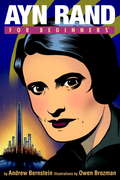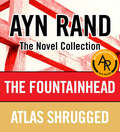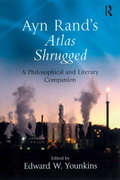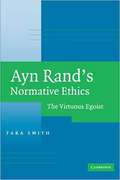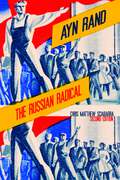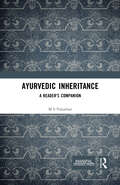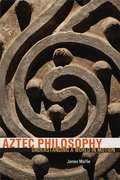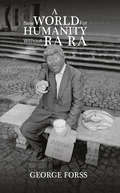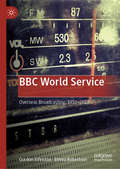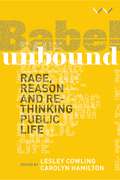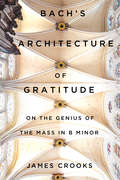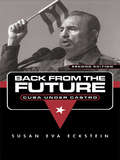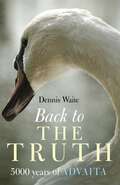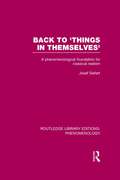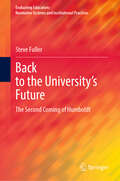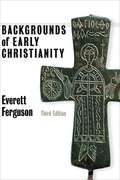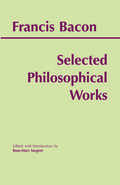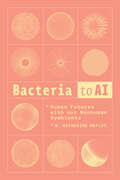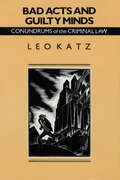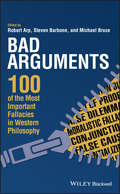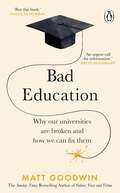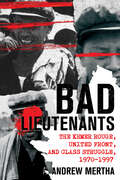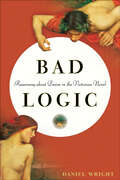- Table View
- List View
Ayn Rand For Beginners
by Andrew Bernstein Owen BrozmanAyn Rand, author of the best-selling novels, The Fountainhead and Atlas Shrugged, is beloved by millions of readers, and equally despised by a significant number of detractors. Her novels and her revolutionary philosophy of Objectivism have acquired a world-wide following. They have also created legions of readers who are hungry for a deeper understanding of her writings. Despite her undeniably significant contributions to the literary canon and the progression of philosophy, there has been no simple, comprehensive introduction to Rand's books and ideas, until now. Ayn Rand For Beginners sheds new light on Rand's monumental works and robust philosophy. In clear, down-to-earth language, it explains Rand to a new generation of readers in a manner that is entertaining, and easy to read and comprehend.From the Trade Paperback edition.
Ayn Rand Novel Collection
by Ayn RandAyn Rand Novel Collection Ayn Rand Two landmark epics from the famed philosopher and "a writer of great power" (The New York Times Book Review), The Fountainhead and Atlas Shrugged explore themes of individuality, freedom, and fascism and feature two of Ayn Rand's most famous characters, Howard Roark and John Galt. The Fountainhead Atlas Shrugged
Ayn Rand's Atlas Shrugged: A Philosophical and Literary Companion
by Edward W. YounkinsSince its publication in 1957 Atlas Shrugged, the philosophical and artistic climax of Ayn Rand's novels, has never been out of print and has received enormous critical attention becoming one of the most influential books ever published, impacting on a variety of disciplines including philosophy, literature, economics, business, and political science among others. More than a great novel, Atlas Shrugged is an abstract conceptual, and symbolic work that expounds a radical philosophy, presenting a view of man and man's relationship to existence and manifesting the essentials of an entire philosophical system - metaphysics, epistemology, politics and ethics. Celebrating the fiftieth year of Atlas Shrugged's publication, this companion is an exploration of this monumental work of literature. Contributions have been specially commissioned from a diversity of eminent scholars who admire and have been influenced by the book, the included essays analyzing the novel's integrating elements of theme, plot and characterization from many perspectives and from various levels of meaning.
Ayn Rand's Normative Ethics
by Tara SmithAyn Rand is well known for advocating egoism, but the substance of that instruction is rarely understood. Far from representing the rejection of morality, selfishness, in Rand's view, actually demands the practice of a systematic code of ethics. This book explains the fundamental virtues that Rand considers vital for a person to achieve his objective well-being: rationality, honesty, independence, justice, integrity, productiveness, and pride. Tracing Rand's account of the harmony of human beings' rational interests, Smith examines what each of these virtues consists of, why it is a virtue, and what it demands of a person in practice. Along the way she addresses the status of several conventional virtues within Rand's theory, considering traits such as kindness, charity, generosity, temperance, courage, forgiveness, and humility. Ayn Rand's Normative Ethics thus offers an in-depth exploration of several specific virtues and an illuminating integration of these with the broader theory of egoism.
Ayn Rand: The Russian Radical
by Chris Matthew SciabarraAuthor of The Fountainhead and Atlas Shrugged, Ayn Rand (1905–1982) is one of the most widely read philosophers of the twentieth century. Yet, despite the sale of over thirty million copies of her works, there have been few serious scholarly examinations of her thought. Ayn Rand: The Russian Radical provides a comprehensive analysis of the intellectual roots and philosophy of this controversial thinker. It has been nearly twenty years since the original publication of Chris Sciabarra’s Ayn Rand: The Russian Radical. Those years have witnessed an explosive increase in Rand sightings across the social landscape: in books on philosophy, politics, and culture; in film and literature; and in contemporary American politics, from the rise of the Tea Party to recent presidential campaigns. During this time Sciabarra continued to work toward the reclamation of the dialectical method in the service of a radical libertarian politics, culminating in his book Total Freedom: Toward a Dialectical Libertarianism (Penn State, 2000). In this new edition of Ayn Rand, Chris Sciabarra adds two chapters that present in-depth analysis of the most complete transcripts to date documenting Rand’s education at Petrograd State University. A new preface places the book in the context of Sciabarra’s own research and the recent expansion of interest in Rand’s philosophy. Finally, this edition includes a postscript that answers a recent critic of Sciabarra’s historical work on Rand. Shoshana Milgram, Rand’s biographer, has tried to cast doubt on Rand’s own recollections of having studied with the famous Russian philosopher N. O. Lossky. Sciabarra shows that Milgram’s analysis fails to cast doubt on Rand’s recollections—or on Sciabarra’s historical thesis.
Ayn Rand: The Russian Radical (Re-reading The Canon Ser.)
by Chris Matthew SciabarraAuthor of The Fountainhead and Atlas Shrugged, Ayn Rand (1905–1982) is one of the most widely read philosophers of the twentieth century. Yet, despite the sale of over thirty million copies of her works, there have been few serious scholarly examinations of her thought. Ayn Rand: The Russian Radical provides a comprehensive analysis of the intellectual roots and philosophy of this controversial thinker. It has been nearly twenty years since the original publication of Chris Sciabarra’s Ayn Rand: The Russian Radical. Those years have witnessed an explosive increase in Rand sightings across the social landscape: in books on philosophy, politics, and culture; in film and literature; and in contemporary American politics, from the rise of the Tea Party to recent presidential campaigns. During this time Sciabarra continued to work toward the reclamation of the dialectical method in the service of a radical libertarian politics, culminating in his book Total Freedom: Toward a Dialectical Libertarianism (Penn State, 2000). In this new edition of Ayn Rand, Chris Sciabarra adds two chapters that present in-depth analysis of the most complete transcripts to date documenting Rand’s education at Petrograd State University. A new preface places the book in the context of Sciabarra’s own research and the recent expansion of interest in Rand’s philosophy. Finally, this edition includes a postscript that answers a recent critic of Sciabarra’s historical work on Rand. Shoshana Milgram, Rand’s biographer, has tried to cast doubt on Rand’s own recollections of having studied with the famous Russian philosopher N. O. Lossky. Sciabarra shows that Milgram’s analysis fails to cast doubt on Rand’s recollections—or on Sciabarra’s historical thesis.
Ayurvedic Inheritance: A Reader's Companion
by M S ValiathanThis book is a companion to Āyurvedic studies. It discusses the history and evolution of Ayurveda, its philosophy, and its practical uses in everyday life—from medicine to mental wellbeing. It harks back to the traditional Indian concept of four aspects of lifelong learning. These were instruction by the teacher, individual effort, learning from companions and lastly, wisdom gathered over a lifetime. Print edition not for sale in South Asia (India, Sri Lanka, Nepal, Bangladesh, Pakistan and Bhutan)
Aztec Philosophy
by James MaffieIn Aztec Philosophy, James Maffie reveals a highly sophisticated and systematic Aztec philosophy worthy of consideration alongside European philosophies of their time. Bringing together the fields of comparative world philosophy and Mesoamerican studies, Maffie excavates the distinctly philosophical aspects of Aztec thought.Aztec Philosophy focuses on the ways Aztec metaphysics--the Aztecs' understanding of the nature, structure and constitution of reality--underpinned Aztec thinking about wisdom, ethics, politics, and aesthetics, and served as a backdrop for Aztec religious practices as well as everyday activities such as weaving, farming, and warfare. Aztec metaphysicians conceived reality and cosmos as a grand, ongoing process of weaving--theirs was a world in motion. Drawing upon linguistic, ethnohistorical, archaeological, historical, and contemporary ethnographic evidence, Maffie argues that Aztec metaphysics maintained a processive, transformational, and non-hierarchical view of reality, time, and existence along with a pantheistic theology. Aztec Philosophy will be of great interest to Mesoamericanists, philosophers, religionists, folklorists, and Latin Americanists as well as students of indigenous philosophy, religion, and art in the Americas.
A New World for Humanity Without Ra Ra
by George ForssA world without Ra Ra is a world for humanity that is placid and secure for a very long time. Ra Ra can mean the way that it sounds (sings) in that this 'mode’ has been the dominant greedy cursory song for the great leaders and saints of all our cultures throughout human history. We always need to have the best people to rule our time-wise cultural advancements and science but now we are going to need to have a check on these! This is so … it is because of an increasing issue that is brewing about our mere survival in this earth home for us. My book details Natural/Spiritual ways that we can be playful and have fun employing remedy to so many of our world's ills. This is the emergency we must face. The fact is that our amazing scientific prowess is making our world an ill place for us. This is something we must deal with. I believe in what I determine to be 'Kindness Solutions’ … that we should operate a cure in this way. We should do this so that we will have a godly joy connected to the fun of such remedies.
BBC World Service: Overseas Broadcasting, 1932–2018
by Emma Robertson Gordon JohnstonThis book is the first full-length history of the BBC World Service: from its interwar launch as short-wave radio broadcasts for the British Empire, to its twenty-first-century incarnation as the multi-media global platform of the British Broadcasting Corporation. The book provides insights into the BBC’s working relationship with the Foreign Office, the early years of the Empire Service, and the role of the BBC during the Second World War. In following the voice of the BBC through the Cold War and the contraction of the British empire, the book argues that debates about the work and purposes of the World Service have always involved deliberations about the future of the UK and its place in the world. In current times, these debates have been shaped by the British government’s commitment to leave the European Union and the centrifugal currents in British politics which in the longer term threaten the integrity of the United Kingdom. Through a detailed exploration of its past, the book poses questions about the World Service’s possible future and argues that, for the BBC, the question is not only what it means to be a global broadcaster as we enter the third decade of the twenty-first century, but what it means to be a national broadcaster in a divided kingdom.
Babel Unbound: Rage, reason and rethinking public life
by Lesley Cowling and Carolyn HamiltonIn this timely, original and sophisticated collection, writers from the Global South demonstrate that forms of publicness are multiple, mobile and varied The notion that societies mediate issues through certain kinds of engagement is at the heart of imaginings of democracy and often centers on the ideal of the public sphere. But this imagined foundation of how we live collectively appears to have suffered a dramatic collapse across the world, with many democracies apparently unable to solve problems through talk – or even to agree on who speaks, in what ways and where. In the 10 essays in this timely, original and sophisticated collection, writers from southern Africa combine theoretical analysis with the examination of historical cases and contemporary developments to demonstrate that forms of publicness are multiple, mobile and varied. They propose new concepts and methodologies to analyse how public engagements work in society. Babel Unbound examines charged examples from the Global South, such as the centuries old Timbuktu archive, Nelson Mandela as a powerful absent presence in 1960s public life, and the challenges to the terms of contemporary debate around the student activism of #rhodesmustfall and #feesmustfall. These show how issues of public discussion span both archive and media, verbal debates in formal spaces and visual performances that circulate in unpredictable ways.
Bach’s Architecture of Gratitude: On the Genius of the Mass in B Minor
by James CrooksEvery lover of music finds themselves, at privileged moments, in ecstasy – certain that what they are hearing has captured, somehow, an incontrovertible truth. In Bach’s Architecture of Gratitude James Crooks explores this profound aesthetic experience in a case study of J.S. Bach’s Mass in B Minor – widely considered among the greatest works of the western choral canon.The book begins with an investigation of compositional principles – of what we might call the mass’s musical architecture. Crooks argues that in its cathedral-like structure, Bach gives us a detailed map of the spiritual journey it triggers. This journey culminates in our apprehension of the world as a gift. And that means, in turn, that the mode of knowing appropriate to its musical ecstasy is gratitude. In the gratitude of aesthetic experience, we learn something crucial about the genuine nature of our own identity, our relations with others, and the character of the things around us. Bach’s genius lies in his capacity to frame these lessons in the mass’s choruses, solos, and duets.Spotlighting the wisdom embedded in gratitude, Bach’s Architecture of Gratitude celebrates music as a pathway to understanding our deepest selves and our intimacy with the world.
Back From the Future: Cuba Under Castro
by Susan Eva EcksteinThis book has long been regarded as the definitive history of Castro's communist regime, beginning in 1959 through the 1990s. This updated, second edition contains a new epilogue by the author that covers the last decade, including such newsworthy events as the Elian Gonzalez controversy, the growing immigrant community of Cuban-Americans in Florida, the role of Cuban-Americans in the 2000 presidential election, the withering U.S. sales embargo and the inevitable transition of power now that Castro is in his mid-70s.
Back To The Truth: 5000 Years of Advaita
by Dennis WaiteA systematic treatment of Advaita which demystifies it, differentiating between approaches and teachers, enabling you to decide which approach is most suitable for you.
Back to 'Things in Themselves': A Phenomenological Foundation for Classical Realism (Routledge Library Editions: Phenomenology)
by Josef SeifertIn an enlightening dialogue with Descartes, Kant, Husserl and Gadamer, Professor Seifert argues that the original inspiration of phenomenology was nothing other than the primordial insight of philosophy itself, the foundation of philosophia perennis. His radical rethinking of the phenomenological method results in a universal, objectivist philosophy in direct continuity with Plato, Aristotle and Augustine. In order to validate the classical claim to know autonomous being, the author defends Husserl's methodological principle "Back to things themselves" from empiricist and idealist critics, including the later Husserl, and replies to the arguments of Kant which attempt to discredit the knowability of things in themselves. Originally published in 1982, this book culminates in a phenomenological and critical unfolding of the Augustinian cogito, as giving access to immutable truth about necessary essences and the real existence of personal being.
Back to Gridlock: Governance in the Clinton Years
by James L. SundquistEighteen essays on the operation of government in 1995.
Back to the University's Future: The Second Coming of Humboldt (Evaluating Education: Normative Systems and Institutional Practices)
by Steve FullerThis volume addresses the central question facing the future of higher education around the world, whether and why universities need to exist at all. This book accepts the question’s premise: It is not clear that the university is any longer needed as an institution -- that is, unless its defenders recover what had made the university the revolutionary institution that over the past two centuries has not only defined the shape of modern systematic inquiry but also the distinctiveness of the societies that have housed them. In short, what is required is a reanimation of the spirit of Wilhelm von Humboldt for our times; hence the book's title and subtitle. Humboldt was responsible for relaunching the university as the vanguard institution of 'Enlightenment' to which we continue to pay lip service – and sometimes not much more than that. Admittedly, the task of relaunching Humboldt today is made difficult because many of the concrete achievements associated with the Humboldtian university – not least academic disciplines and nation-states – are increasingly seen as problematic if not obsolete. However, the global reach of the Humboldtian vision in its 19th century and 20th century heyday offers hope that it may be recovered in the 21st century. The book focuses on the performative character of the academic vocation, what Humboldt memorably characterized as the 'unity of research and teaching' in the same person, a role model for students and society at large. The book's seven chapters develop this theme in a historically and philosophically nuanced way in terms of the Humboldtian vision of knowledge, sense of free expression and critical judgement, and commitment to translation and publicity.
Backgrounds Of Early Christianity
by Everett FergusonHaving long served as a standard introduction to the world of the early church, Everett Ferguson's Backgrounds of Early Christianity has been expanded and updated in this third edition. The book explores and unpacks the Roman, Greek, and Jewish political, social, religious, and philosophical backgrounds necessary for a good historical understanding of the New Testament and the early church. New to this edition are revisions of Ferguson's original material, updated bibliographies, and fresh discussions of first-century social life, of Gnosticism, and of the Dead Sea Scrolls and other Jewish literature.
Bacon: Selected Philosophical Works
by Francis Bacon Rose-Mary SargentThe most comprehensive collection available in paperback of Bacon's philosophical and scientific writings, this volume offers Bacon's major works in their entirety, or in substantive selections, revised from the classic 19th century editions of Spedding, Ellis, and Heath. Selections from some of Bacon's natural histories round out this edition by showing the types of compilations that he believed would most contribute to the third part of his Great Instauration.<P><P> Each work has a separate brief introduction indicating the major themes developed. In her general Introduction, Sargent gives a biographical sketch of Bacon's early life, education, and legal career, discusses the major components of his philosophical project, and traces his influence on subsequent natural philosophy. In addition, she looks at the primarily negative evaluations of Bacon's methodological writings by philosophers of science in the first half of the twentieth century, the reassessments of his works that took place as the influence of logical empiricism declined, and the current revival of interest in Bacon that coincides with the focus on experimental practice today.<P> A bibliography and index complete the text.
Bacteria to AI: Human Futures with our Nonhuman Symbionts
by N. Katherine HaylesA new theory of mind that includes nonhuman and artificial intelligences. The much-lauded superiority of human intelligence has not prevented us from driving the planet into ecological disaster. For N. Katherine Hayles, the climate crisis demands that we rethink basic assumptions about human and nonhuman intelligences. In Bacteria to AI, Hayles develops a new theory of mind—what she calls an integrated cognitive framework (ICF)—that includes the meaning-making practices of lifeforms from bacteria to plants, animals, humans, and some forms of artificial intelligence. Through a sweeping survey of evolutionary biology, computer science, and contemporary literature, Hayles insists that another way of life, with ICF at its core, is not only possible but necessary to safeguard our planet’s future
Bad Acts and Guilty Minds: Conundrums of the Criminal Law (Studies in Crime and Justice)
by Leo KatzWith wit and intelligence, Leo Katz seeks to understand the basic rules and concepts underlying the moral, linguistic, and psychological puzzles that plague the criminal law. "Bad Acts and Guilty Minds . . . revives the mind, it challenges superficial analyses, it reminds us that underlying the vast body of statutory and case law, there is a rationale founded in basic notions of fairness and reason. . . . It will help lawyers to better serve their clients and the society that permits attorneys to hang out their shingles."—Edward N. Costikyan, New York Times Book Review
Bad Arguments: 100 of the Most Important Fallacies in Western Philosophy
by Robert Arp Michael Bruce Steven BarboneA timely and accessible guide to 100 of the most infamous logical fallacies in Western philosophy, helping readers avoid and detect false assumptions and faulty reasoning You’ll love this book or you’ll hate it. So, you’re either with us or against us. And if you’re against us then you hate books. No true intellectual would hate this book. Ever decide to avoid a restaurant because of one bad meal? Choose a product because a celebrity endorsed it? Or ignore what a politician says because she’s not a member of your party? For as long as people have been discussing, conversing, persuading, advocating, proselytizing, pontificating, or otherwise stating their case, their arguments have been vulnerable to false assumptions and faulty reasoning. Drawing upon a long history of logical falsehoods and philosophical flubs, Bad Arguments demonstrates how misguided arguments come to be, and what we can do to detect them in the rhetoric of others and avoid using them ourselves. Fallacies—or conclusions that don’t follow from their premise—are at the root of most bad arguments, but it can be easy to stumble into a fallacy without realizing it. In this clear and concise guide to good arguments gone bad, Robert Arp, Steven Barbone, and Michael Bruce take readers through 100 of the most infamous fallacies in Western philosophy, identifying the most common missteps, pitfalls, and dead-ends of arguments gone awry. Whether an instance of sunk costs, is ought, affirming the consequent, moving the goal post, begging the question, or the ever-popular slippery slope, each fallacy engages with examples drawn from contemporary politics, economics, media, and popular culture. Further diagrams and tables supplement entries and contextualize common errors in logical reasoning. At a time in our world when it is crucial to be able to identify and challenge rhetorical half-truths, this bookhelps readers to better understand flawed argumentation and develop logical literacy. Unrivaled in its breadth of coverage and a worthy companion to its sister volume Just the Arguments (2011), Bad Arguments is an essential tool for undergraduate students and general readers looking to hone their critical thinking and rhetorical skills.
Bad Education: Why Our Universities Are Broken and How We Can Fix Them
by Matt Goodwin'Buy this book' DOUGLAS MURRAY'An urgent call for reformation’ DAVID GOODHARTTHE EXPLOSIVE NEW BOOK FROM THE SUNDAY TIMES BESTSELLING AUTHOR OF NATIONAL POPULISM AND VALUES, VOICE AND VIRTUE.Depressed tutors and disillusioned students. Funding crises and falling standards. Culture wars and campus protests. Welcome to the broken world of academia. Welcome to Bad Education.-------------------------Our universities are broken. Established as sanctuaries of truth and higher learning, they are now decaying institutions that are failing a generation of young people. Consumed by funding and admissions crises, mired in political scandal and governed by self-interest, their founding principles have been corrupted. This explosive book shows us why, and what we must do to fix them.Matt Goodwin spent decades working as an academic in some of the world’s leading universities, delivering underfunded courses to increasingly disengaged lecture theatres, sitting on rudderless committees, counselling depressed colleagues and concerned students, watching standards slip and academic integrity decline.At the heart of this crisis is an increasingly politicised campus. Once bastions of free speech, forums for open debate and incubators of bold new ideas, our universities are increasingly becoming monocultures, ruled by an ideology that is silencing respected voices, stifling discussion and violently shutting down diverse opinion, betraying intellectual freedom and failing to deliver the very basics of an education.Unflinching, shocking and urgent, this first-hand account provides an insider's view of how the founding principles of academia are in decline and why we should all consider what this means for the students of today, tomorrow and the world they will shape.
Bad Lieutenants: The Khmer Rouge, United Front, and Class Struggle, 1970–1997
by Andrew MerthaBad Lieutenants is a riveting account of how the Khmer Rouge remained a force to be reckoned with even after the fall of Democratic Kampuchea—and of the men behind the movement's strange durability.In 1979, the Vietnamese army seized Phnom Penh, toppling Pol Pot's notoriously brutal regime. Yet the Khmer Rouge did not disintegrate. Instead, the movement continued to rule over swathes of Cambodia for almost another two decades even as it failed to become a legitimate governing organization.Andrew Mertha argues that the Khmer Rouge's successes and failures were both driven by a refusal to dilute its revolutionary vision. Rather than take the moderate tack required for viable governance, it pivoted between only two political strategies: united front and class struggle. Through the stories of three key leaders—Ieng Sary, Son Sen, and Ta Mok—Mertha tracks the movement's shifting from one strategy to the other until its dissolution in the 1990s. Vividly written and deeply researched, Bad Lieutenants reveals the powerful grip political ideology can have over the survival of insurgent movements.
Bad Logic: Reasoning about Desire in the Victorian Novel
by Daniel WrightHow did the Victorians think about love and desire?"Reader, I married him," Jane Eyre famously says of her beloved Mr. Rochester near the end of Charlotte Brontë’s novel. But why does she do it, we might logically ask, after all he’s put her through? The Victorian realist novel privileges the marriage plot, in which love and desire are represented as formative social experiences. Yet how novelists depict their characters reasoning about that erotic desire—making something intelligible and ethically meaningful out of the aspect of interior life that would seem most essentially embodied, singular, and nonlinguistic—remains a difficult question.In Bad Logic, Daniel Wright addresses this paradox, investigating how the Victorian novel represented reasoning about desire without diluting its intensity or making it mechanical. Connecting problems of sexuality to questions of logic and language, Wright posits that forms of reasoning that seem fuzzy, opaque, difficult, or simply "bad" can function as surprisingly rich mechanisms for speaking and thinking about erotic desire. These forms of "bad logic" surrounding sexuality ought not be read as mistakes, fallacies, or symptoms of sexual repression, Wright asserts, but rather as useful forms through which novelists illustrate the complexities of erotic desire.Offering close readings of canonical writers Charlotte Brontë, Anthony Trollope, George Eliot, and Henry James, Bad Logic contextualizes their work within the historical development of the philosophy of language and the theory of sexuality. This book will interest a range of scholars working in Victorian literature, gender and sexuality studies, and interdisciplinary approaches to literature and philosophy.
